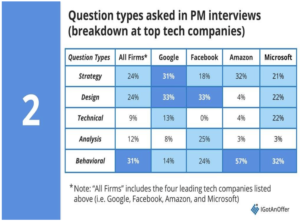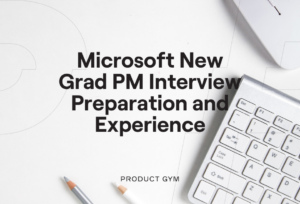Imagine this: You’re in the midst of looking for a new Product Manager job and you’ve been successful with sending your resume and following up on your choice of roles — so what’s next? You’ll be called for an interview, and you’ll need to dive into the project of Product Manager interview preparation.
The Product Manager interview process includes four rounds with different company stakeholders. It takes a lot of time and energy to prep for each round — which is why we are proud to present the ultimate Product Manager Interview Preparation Checklist.
Use this list for insights and helpful reminders on your next round of Product Manager interviews, and if you need more advice or have questions, reach out to us. We’re here to take you every step of the way.
Let’s start with the basics, shall we?
1. Bulletproof Your Resume
Your resume will need to stand apart from the rest and that’s not an easy feat. You’ll need a resume that can bypass ATS software while also standing up to the scrutiny of your interviewers. From resume buzzwords to the best fonts and formats, there’s a lot to consider. That’s why resume refinement is one of the main areas of branding that we focus on first in our program.
2. Pair Your Resume With a Top Notch Cover Letter
You don’t need a cover letter for every round of the interview process. In fact, the recruiter conducting your first-round call is not even going to glance at it. And yet, before you can call your Product Manager interview preparation is complete, you need to pen a personality-filled cover letter. The cover letter is a key element of your branding package, along with your resume, your LinkedIn, and the personal elevator pitch (which we’ll talk about later). The stakeholders in your third and fourth round of interviews are going to read your cover letter to get a better idea of who you are as a person and to try and see beyond what’s on your resume. You can access free webinar training on how to put together the ultimate cover letter here.
3. Ace Your Product Management 101
Each interview round is going to bring you face to face with technical questions about your background, the skills required for the job, and the company’s work. Make sure your Product Manager interview preparation includes brushing up on basic product management terminology so that you’re not fumbling for words when the interview gets technical. Know how to speak the language of the product world.
4. Do Your Research
blogs and articles about Product Manager interviews will tell you to do your research, but they won’t always tell you exactly what you need to research. Here are three elements to check off your list to make sure the research portion of your Product Manager preparation is complete:
- Do a background check on your interviewers: Are they a Hiring Manager, stakeholder, or a Product Lead? What members of the product team will you be interviewing with?
- Read the posting and job description again: Companies will often tell you exactly what they’re looking for and what problem they’re trying to solve in the initial job posting where you applied. What key responsibilities stand out? What does the wording tell you about the company culture and type of personality fit they might be hiring for?
- Learn about the company’s product: You want to know what the company creates, how they do it, and the values that drive its product culture. Why? Firstly, how else can you determine whether or not this is a company you’d be happy working for? Ideally, you want to work in an environment where you’re passionate about your work (you should care about the product) and where you’re happy with your team (the product culture should suit you). Secondly, you can bet that you’ll be asked company-specific questions in the second round interview with the Hiring Manager. If you don’t know anything about their product, their recent successes, or their values, it’s going to become apparent that you didn’t put a lot of thought into applying.
- Compile your past mistakes: Interviewers love hearing what you’ve done wrong in the past and how you’ve learnt and developed from it. Therefore, by making sure you have a compiled list in your head, you’re able to present your examples quickly and efficiently. You can bet on being asked about your greatest weaknesses in an interview, so take some time to reflect on how you’ve learned from failure in the past.
5. Prepare Your Killer Pitch
Practicing the killer pitch is one of the most essential parts of your Product Manager interview preparation. You’re guaranteed to encounter the “Tell me about yourself” interview question, but aside from that, you need to show the interviewer that you’re the ultimate hire. Impressing the interviewer with your pitch all comes down to how you position your background, skill set, and previous experience. Your pitch should be customized to the company you’re interviewing for, as well as to the specific stakeholder you’re talking to. At the same time, you need to stay true to who you are as a Product Manager.
6. Optimize Your Online Presence
Take some time to optimize your digital platforms. This can start off with making sure you’re making LinkedIn connections and expanding your networks, as well as listing your skills, experience and previous work. Furthermore, this also includes cleaning up any other social media channels as jobs use this as a ‘go-to’ for finding out about their applicants. If you want to take this further, you can improve your online presence by establishing your own website or blog to document and show off your previous work, the events you’ve attended as well as jobs you have done.
7. Learn the Product Manager Interview Question Types
From the bank of interview questions we’ve compiled over the years, we’ve noticed seven types of Product Manager interview questions:
- Introductory Questions
- Questions About Your Background
- “About You” Questions
- Company-Specific Questions
- Behavioral Questions
- Technical Questions
- Product Management Questions*
*Technically all the questions in a Product Manager interview are product management questions, but this last question type covers those that relate to product lifecycle, strategy, and prioritization.
By practicing what may come up with example questions, you ensure that you’re well prepared for the interview, thus increasing your chances of impressing the interviewer. An effective way of doing so is by learning the STAR method — Situation (introduce it to set the context), Tasks (describe how you completed it), Action (explain what you did and how you did it) and Result (list the outcomes of your efforts). Not only will this prove to the interviewer that you are concise and prepared, but it helps take off the pressure and eases your nerves by providing a structure you can follow. Check out the video below to learn more about using the STAR Method:
8. Practice Mock Interviewing the Right Way
All too often, mock interviews become a crutch that aspiring Product Managers rely on as they prepare to interview for the job of their dreams. You know what’s more useful than practicing how to interview with your peers in a no-pressure environment? Practicing the real thing.
Mock interviews are at their most helpful when you use them in your beginning stages of preparation when you’re getting familiar with questions and formulating how to structure your answers for the first time. You should make sure that your mock interviews cover the following:
- Tackle the right questions. Don’t spend time working on easy questions that you feel most comfortable with: use mock interviews as a safe environment to sort out the questions you’re expecting that still intimidate you.
- Make sure that you take the time to vet and improve your answers. How can you make your examples more relevant and your stories more engaging?
- Choose your interview partner wisely. You’ll want a mock interview partner who is as invested and ambitious as you. Make sure your mock interview partner has experience interviewing, and that they’re not afraid to give you honest feedback.
9. Jot Down Your Questions for the Interviewer
This shows that you are engaging with the company and you have a real interest in the job. However, remember that every question demonstrates your intent — for example, “What are the opportunities for progression” demonstrates your passion for professional growth and that you aim to stay loyal to the organization.
10. Never Stop Networking
With some dedication and strategy, networking can be a creative way to keep generating more interviews. But it’s not as easy as going to meetups or sending out some emails. If you’re going to rely solely on networking to generate your interviews, you’re going to be missing plenty of opportunities for interviews you could have landed if you applied directly through the company site with your killer resume and cover letter. You need to consider networking as an extra source of interview generation.
Networking should be a strategy you take on when you already have some product management experience and are looking to make a lateral move. Let us say that again: networking will most likely not be effective for you if you’re new to the industry. There are five key steps to follow to implement the ultimate networking strategy:
11. And Never Stop Applying
Maybe you’ve landed multiple interviews and have made it into the final rounds for a company you’re excited about. You should focus your energy on just interviewing with them from here on out, right? No! Let us remind you that interviewing is a numbers game. This doesn’t stop when you’re into the final rounds. You want to continue generating more interviews so that you have more chances to obtain more offers. Continuing to interview with other companies gives you leverage in a salary negotiation, and shows the interviewer how in demand your skillset is, making them feel more of an urgency to hire you.
And in order to generate more interviews and offers, you need to keep applying. Keep applying even as you prep.
12. Persevere
Whatever job market you try to enter into, it is going to be a competitive space. You will face job rejections, however, it is how you deal with these and use their feedback and constructive criticism to improve your future job applications. Don’t give up: if you’re consistently facing rejection or failing to secure offers, take it back to the drawing board.
How can you improve your branding package? How can you better structure your answers to common interview questions? If all else fails, turn to the Product Manager community for some support: interviewing is rough, and it helps to have people who’ve been where you are now in your corner. Keep going!
13. Hone Your Approach With a Professional Interview Coach
If you’re struggling to convert Product Manager interviews into job offers, interview coaches like the ones at Product Gym can help you develop a strategic approach to incorporating the right Product Manager buzzwords and acing every round.
Our interview coaches provide a range of services to help you navigate the gruelling Product Manager interview process as an aspiring or first-time Product Manager. Some of these services are tangible and easy to unpack, like reviewing your case study presentations before you submit them, helping you formulate the best answers to prep for tricky first and second-round interview questions, and providing strategic advice on salary negotiation.
But product management interview coaches can also help you in more hard-to-describe ways. For example, Product Gym interview coaches might help you recognize red flags in the interview and navigate which companies you do and don’t want to pursue based on culture fit. They can also help you build your confidence, crush imposter syndrome, and develop a growth mindset. Our goal is to help our members land a Product Manager job they love, and succeed in their day-to-day as a PM. All in all, an interview coach will help ensure you make the absolute best impression possible on your interviewer.
What the Experts Say
At Product Gym, our coaches are available every day to help our members prepare for their interviews at every round. They’re on hand after your interview as well, to talk over what you felt went well and help you nail down areas of improvement with real-time feedback. Here’s what our coaches have to say about the Product Manager interview preparation essentials:
For First-Timers:
“Own it. You are a Product Manager! 🙂 Make sure you’ve prepared your pitch and have 2-3 (at least) stories that you can use interchangeably for your behavioral interviews/questions.”
Ken Apostol, Product Manager
For Improving As You Interview:
“Record the interview and then play it back and you’ll quickly identify the areas where your responses were spot on (quick/intelligent/articulate), need improvement (stumbling/“ummm”/ too vague), and flat out terrible (“I’m not sure”/ really awkward silence/ completely unintelligible)”
James Kocher, Product Manager Career Coach
How to Prepare for Product Manager Interviews at FAANG Companies
When it comes to the Big Five (Facebook, Apple, Amazon, Netflix, and Google), it’s worth your time to go a little further with your interview preparation. Here’s some additional, company-specific information on how to be ultra-prepared for the FAANG interview process.
Although missing Netflix and Apple, the image below breaks down the structure of its interview questions and how they are categorized and gives an insight into what to expect:

The interviewer will know that Google puts its users first and values their customer experience. This means that a lot of the Google Product Manager interviews will be based on behavioral questions but also on how the candidate would find ways of improving the customer experience. Other questions will ensure you’re a cultural fit for the company, as well as making sure you’re knowledgeable on data and analytics.
Apple
Apple’s interviews tend to be characterized by behavioral questions that seek why you would like to work there and the knowledge you have of their products. The Hiring Manager will be adamant about asking questions regarding whether you fit in with its culture. Brush up on company history and core values in your Apple Product Manager interview preparation. Apple’s core values are Accessibility, Education, Environment, Inclusion and Diversity, Privacy, Racial Equity and Justice, and Supplier Responsibility.
You should know that these values also inform the company’s product strategy and the features they build into each device and service. Knowing the company culture can help you consider their product needs as well.
Netflix
Similar to Apple, Netflix uses its interview process to determine your fit with the company as well as your knowledge of what they do and the products that they provide.
Amazon
The Amazon interview process can be incredibly lengthy — sometimes it has been known to include six different stages and can last anywhere between three to six weeks. The interview questions cover all areas, so ensure you’re prepared to answer strategy, technical and behavioral questions.
Facebook has an extensive interview process, but as long as you’re prepared you have nothing to worry about. Expect your interview to be divided into three main themes:
- Product sense
- Execution
- Leadership and drive
It’s a lengthy and in-depth process, but Facebook makes very little secret about what steps you need to take to be successful: you just have to put in the work and effort.
Prepare to Crush Your Interview
At the end of the day, you should spend your prep time on the areas you feel you need to focus on. You want to go into every stage of the interview confident and ready to blow away the competition. Your preparation time should be as valuable and productive as possible: whatever that looks like for you. Hopefully, this checklist gave you an idea of how to organize that time! Ready to start generating interviews? Check out our exclusive Product Manager job board; we update it daily with the freshest openings on the job marketing so you can avoid searching and focus on applying!



